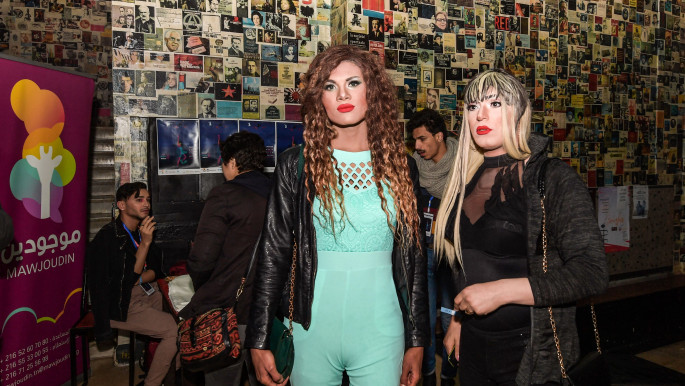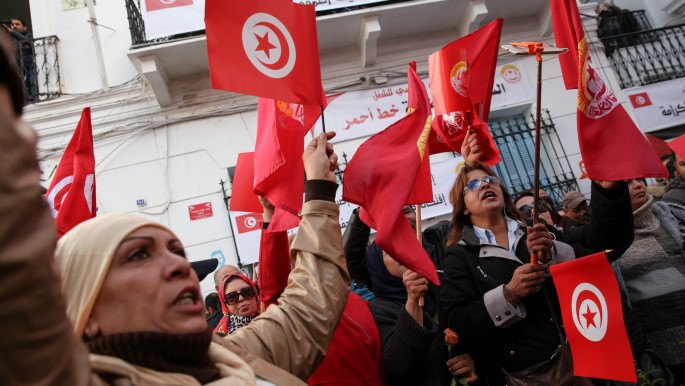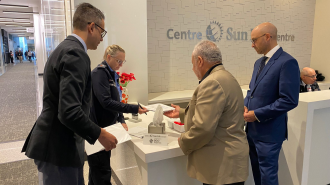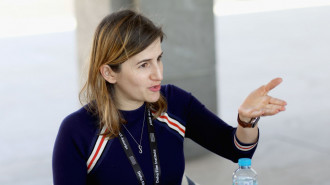Tunisia's queer festival makes proud comeback
The Mawjoudin Queer Film Festival – a ground-breaking event that promotes queer culture in a country where homosexuality continues to be criminalised – returned for the second year in Tunisia and the MENA region late last month.
Over 300 people turned up at the opening in downtown Tunis at the end of March, in a festive, friendly ambience with a touch of colourful diversity.
The entrance of a cinema was crowded with Tunisians, especially young people, cheering in a cry of joy and celebration, waiting impatiently for the start of the happening.
"For the LGBT community here, this festival is like getting some fresh air," said Alaa, event organiser and active member of Mawjoudin (We Exist), a Tunisian association promoting LGBTQI and equal rights for all in Tunisia.
"It's a time when queer people can leave behind their daily worries of being discriminated, a space where they can live their sexual orientation or gender identity freely."
The organiser said the event is there to challenge the acts of discrimination suffered by LGBTQI+ individuals in the Tunisian society, and to create a safe place for the gay community within the public space.
 |
|
| Read also: 'We are human and we have rights': LGBT activists speak out across the Middle East |
"We believe that art is a means of resistance, and it can change mentalities in the society," he stated.
A young, ambitious initiative, the first of its kind in the Arab region, emerged from Cinexist, the cinema club of Mawjoudin.
The festival organising committee decided to scrap the competition not to privilege some film-makers over the others, and instead to enable exchange and debate among the participants.
The festival featured 31 films from 15 countries from Tunisia and across the world, mostly from the global south, panel discussions, workshops, performances and exhibitions.
Tunisia participated with a short film, Ymin el Baccouche by Tarek Sardi, and a documentary, Travestie by Safwen Abdellali.
Talking about his film, Sardi described the story as a "sex triangle" where a woman is married to religious conservative man who's in denial about his own homosexuality. During their university time, both were having an affair with the same man who then served a three-year sentence in jail for being gay and consuming drugs. Many years later, the untold truth came out leading to a fight.
"With all the stereotypes we have about sexual orientations and gender identities in the Tunisian society, this film can help deconstruct the stereotypical depiction of LGBTQI people and show the diversity within their community," the young film director said.
 |
|
| Tunisian transgenders attend the opening of the second edition of the Mawjoudin Queer Film Festival [Getty] |
Sardi's short, which was co-produced by Mawjoudin, opened the festival, and it was followed by Rafiki by Walnuri Kahiu, a film about two Kenyan girls in love with each other in their home country.
This year's edition shed light on issues centred around queer identities and people from the South, encouraging a culture alternative to heteronormative and cisgender portrayal of southern communities in cinema.
Several nationalities were represented with Kenyan, Chinese, Argentinean, Brazilian, Indian and Pakistani films among others.
Indian film director Faraz Ansari stood out in the festival where he presented his Sisak, India's first silent queer film which has become the first ever Indian film to win 59 international awards. The 20-minute long film is a gay love story but also a politically and socially aware one raising questions to the state and society.
"While making Sisak, I realised the responsibility that a film-maker has, especially a queer film-maker," Ansari said. "The film is personal but at the same time it talks to everyone in the room. This is the first Muslim country where I'm showing it, and I'm very glad of it."
 |
|
| Read also: Tunisian women move forward but gender equality remains distant hope |
During the festival, the Indian film director also conducted two workshops. One of them dealt with the importance and significance of socially and politically aware queer cinema tackling how to create diverse cinema that is universal though rooted in the country of origin.
"The fact that we are in Tunisia, where homosexuality is illegal, showing queer films and running these workshops openly. How wonderful is that! That's how you open up conversations," he continued. "Cinema is a powerful tool of social change. You can change lives through a film."
Hanging out outside the venue of a performance, a young Tunisian called Ghassene shared some of his thoughts about the festival.
"I like the idea of focusing on cinema from the global south. It gives visibility to films that we don't have the chance to see on the screen, and we connect more closely with people in the Maghreb and the rest of Africa," Ghassene said.
"The festival is packed with people, there's free space and security which is what we need," he added.
For security reasons, Mawjoudin did not disclose details about locations where the festival events were held.
Hosting a queer festival in Tunisia where not only homosexuality is criminalised but the society is clearly conservative vis-à-vis non-normative identities is in itself an act of resistance.
"This festival is another chance to say loud and clear that we demand the repeal of Article 230 and all repressive laws against the gay community at a legal but also socio-cultural level," Alaa concluded.
Although LGBT activists in Tunisia have come to the fore on issues related to sexual minorities and gay rights, since the 2011 revolution their status remains very precarious due to social rejection and anti-gay legislation.
Article 230 of the Tunisian criminal code condemns homosexuality with up to three years in prison.
Alessandra Bajec is a freelance journalist currently based in Tunis.
Follow her on Twitter: @AlessandraBajec







 Follow the Middle East's top stories in English at The New Arab on Google News
Follow the Middle East's top stories in English at The New Arab on Google News


